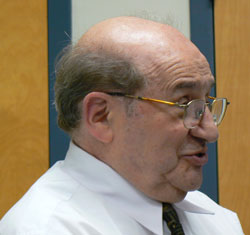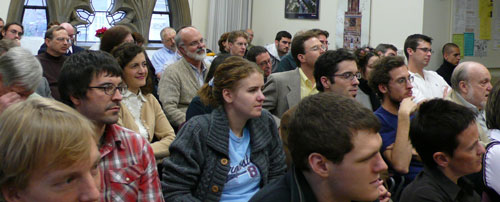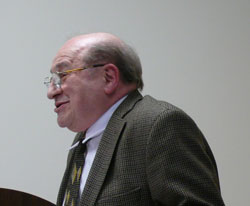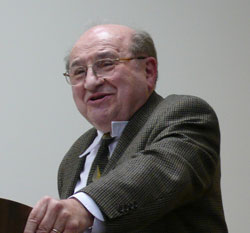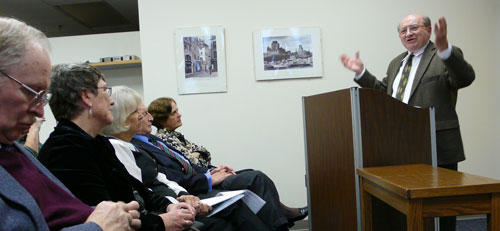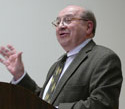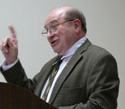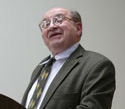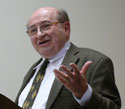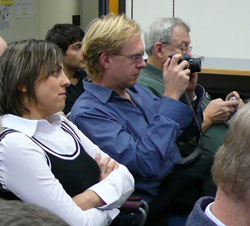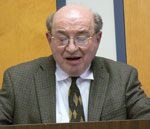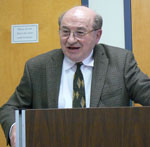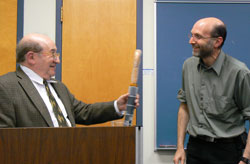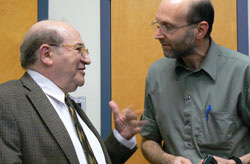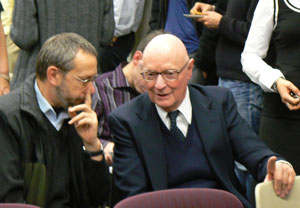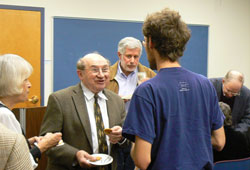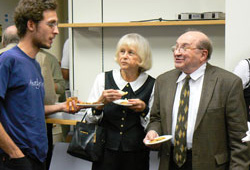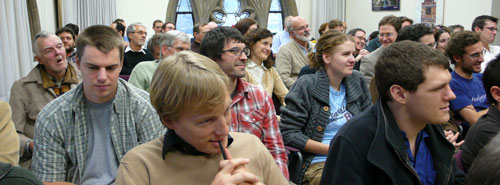
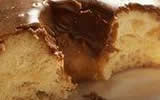
![]()
::: postdoc fellowships
::: senior fellowships
::: resident fellowships
::: associateships
![]()
being here
::: visiting
::: the last donut
::: photo album
::: center home >> being here >> last donut? >> 1 December 2006 |
Friday, 1 December 2006 In 1960, more than three years before the Beatles appeared on the Ed Sullivan show, Adolf Grünbaum came to Pittsburgh to be the founding Director of the Center for Philosophy of Science. For 46 years he has been its Director and then its Chair. Today Adolf is giving a talk.
Of course I should have realized that would be his attitude. For Adolf's professional career is marked by an uncompromising intolerance for what he deems intellectual foolishnesses, be they theism, postmodernism or the excesses of Freud's psychoanalysis. This last excess is the topic of today's talk. It is a special event for us, since Adolf does not give talks very often in the Center. He is almost constantly on the road, giving them elsewhere. Seeing the oddness of it, Adolf decided that it was time the cobbler's children were brought new shoes. He set about it with characteristic thoroughness. With multiple calls to our office, he labored over the timing, the title, the precise distribution of announcements and more. Our starting time has come. It is 3:30. Almost every seat is taken. Adolf's wife, Thelma, is a welcome addition to the front row and a sign that this is no ordinary event. People are drifting in, scanning for empty seats. Would Adolf mind if we delay just a moment while more chairs are brought in? We won't bring many. We are perilously close to the room limit set by the fire codes. Then comes my introduction, which only awkwardly balances celebration, reverence and humor; and Adolf steps to the lectern. He apologizes for his raspy voice from a mild cold and promises to suck lozenges.
While he was born in Germany, his voice shows no trace of a German accent. Yet there is something very Germanic in his speech. He begins by recalling how, in the 1970s, he had become interested in psychoanalysis. He then knew as much about it as an average American sophomore. "And that means," he pronounced with a perfectly timed pause, "not much." An awkward, reflexive giggle rippled through the room. He recalled how he grew very suspicious of psychoanalysis and especially of Karl Popper's critique of it.
"Just incoherent," Adolf exulted, he has "fundamentally misdiagnosed its failure as a scientific theory" and this within the "lynchpin of Popper's philosophy." Adolf proceeded to detail how, in the 1980s, he had faced Popper and described several ways in which psychoanalysis could be falsified; and these were subsequently recorded in his writings. Adolf had warned me beforehand that he would speak for 60 minutes, but that he would soften the analysis with some lighter anecdotes, lest we become overtaxed by an hour of closely reasoned argumentation. How he had misjudged this room. This anecdote did not just relieve us; it had enthralled us. There was a time when Titans roamed the earth, throwing great boulders at one another and forming the valleys and mountains over which we now navigate. Here was one of those Titans, recounting the building of mountains in the first person. The principal narrative proceeded. Adolf described how he had looked at the then existing philosophical literature on psychoanalysis. Naming names, he reported that he had been "appalled and massively disappointed by its serious misunderstandings" and its use of "desultory snippets from Freud" to advance a particular author's misconceptions. So Adolf now set out to lay bare the logical structure of psychoanalysis and its shortcomings. He defined terms carefully. Repression is the banishing of something from awareness; supression is merely refraining from verbalizing it. Then the theory of repression, the cornerstone of psychoanalytic theory, was developed in four groups of theses. They are, he warned, "quite a mouthful." Centrally they include the claim that the repression of painful memories is what causes neuroses, dreams and the famous Freudian slips; and that Freud's method of free association can both reveal what is repressed and be therapeutic. Those who have read Adolf's writings will know that his prose is built from long Germanic sentences with perfect grammar and a slight penchant for nouns over verbs; and a broad vocabulary. I'll confess. More than once, his writings have sent me to the dictionary. The teenager who fled Nazi Germany to the US and needed to accommodate a new language and culture has amassed a vocabulary that puts to shame the country's native born sons and daughters. The writing is a marvel of classical construction, yet most readers will tell you that they are easily lost in its labyrinthine halls. Now here was Adolf standing before us reading aloud from a script written in that same, labyrinthine prose. I had been struggling to jot some of it down, but its clauses were so long that I could not capture them before being distracted by the next clause. Yet the result was anything but leaden. Adolf's thoughts flowed easily through the room. We tittered. We giggled. We laughed. How was this possible, I wondered. I began a diagnosis. Part of it was Adolf's demeanor. A powerful mix of emotions poured past the lectern over which he peered at us. His face and the dramatic modulations of his voice told us instantly that he was at once shocked by his subject's perversity, astonished at its gall and, most of all, that he was thoroughly amused. His pervasively beaming smile told us that folly can be great comedy and debunking it even greater fun. As the waves sweep past, it becomes easier and easier to let them carry you off.
Now it was time for Adolf to turn to the debunking. It was a systematic attack on all fronts. It was not so much a Kurt Goedel using ingenious mathematical and logical constructions to reverse what had formerly seemed irrefutable truisms. It was closer to the outburst of an all-suffering visitor who finally says the obvious thing that everyone in the room dared not even think: "Your dear child is ugly and badly behaved!" But Adolf's critique is not an intemperate outburst that is retracted with apologies. It is the forthright statement of a diagnostician who knows no other way to alert a patient in sleepy denial to the gravity of his illness.
The debunking continued with a mixture of outrage and amusement. The methodical argumentation soon merged in my thoughts with the astonished anecdotes from earlier in the talk. Adolf had recalled the psychoanalyst Melanie Klein's analysis of her own son. To avoid bullies, he had taken a different route to school that happened to be tree lined. In those trees, Klein saw phallic symbols and that the road had been chosen by her son to express his conflict over his sexual lust for his mother. "Physician heal thyself!" Adolf thundered. In that story, we glimpsed that what was at stake was more than merely debunking some academic excess. Adolf was concerned to protect the innocent from what he called the "psychonoxious effects of Freudian treatment."
How curious, I thought. Adolf's earlier speech had included a thorough denunciation of inadequate accounts of inductive inference, most notably, simple-minded hypothetico-deductivism. Yet here he was apparently touting the power of that most misused source of evidence, purely anecdotal reports. Was this an item for question time, I wondered? No. Adolf was too good for that. It had all the earmarks of a classic, philosopher's ambush. Now the talk was over. Freud's "house of cards" was demolished. As the applause quietened, I presented Adolf with his umbrella. I showed him how it worked--how the plastic dripguard telescoped with a satisfying clack-clack-clack over the dripping umbrella. May I open it to show him the Center logo? Was he superstitious, I inquired. He beamed and announced that getting this umbrella was the best thing that had happened to him in all his years at Pittsburgh! The gracious acceptance was asserted with such force and sincerity that, for just a moment, we both truly believed it. There were no donuts and bagels to be eaten in the break. Instead, since this was an afternoon event, Joyce had procured five different types of cookies to be consumed with coffee. They included an astonishing triple chocolate chunk cookie and no bake cookies that brought misty memories of home to Jackie, our work study student, who had artfully laid them out on the plates. We convened for questions, which Adolf cautiously promised only to "try to answer." While the room had been amused by Adolf's talk, it was also clear that it was ready to dispute. However Adolf is difficult to dispute. "What are the standards to which psychoanalysis should be held?" came the inquiry, as a warm up to the real question. Adolf, eager to proceed, already saw a trajectory and interjected with a long response. Was that it, he eventually inquired? Well, no. The questioner proceeded to the next sentence and the cycle repeated until the question was fully formed. In biology, perfect, exceptionless laws are rare. Most laws hold except when they don't. Why should we hold Freud to a higher standard? Well, Adolf replied, we should because that was Freud's own standard. Freud himself was a complete determinist. The questions continued and were wide-ranging, asking after connections between repression and the recent phenomenon of recovered memory therapy and between Popper's demarcation criterion and the pragmatics of debunking Intelligent Design. Two hours after it started, I could see the room flagging and I called the proceedings to a close. Adolf, at 83 years with his mild cold and the undiminished elasticity of an India rubber ball, seemed disappointed that the fun was over so soon. John D. Norton |
